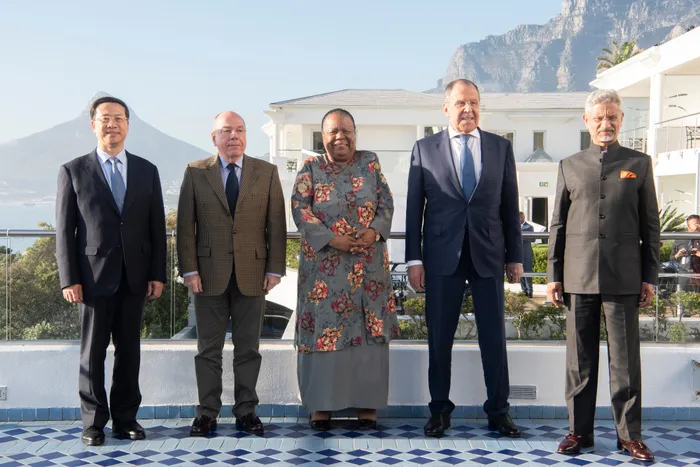BRICS must be held to high standards if it wants credibility

Photo: RODGER BOSCH/AFP - Ma ZHaoxu, deputy Minister of Foreign Affairs of China, Mauro Viera, Minister of Foreign Affairs of Brazil, Naledi Pandor, South African Minister of International Relations and Cooperation, Sergei Lavrov, Minister of Foreign Affairs of Russia , and Subrahmanyam Jaishanker, Minister of Foreign Affairs of India, pose for photos at the BRICS (Brazil, Russia, India, China, South Africa) Foreign Ministers Meeting on June 01, 2023, in Cape Town.
By Dr Sizo Nkala
When the BRICS group was established in 2009, it was widely viewed as an economic grouping. It was an association of emerging economies whose global relevance was being propelled by the enormous economic potential of its members.
BRICS countries felt limited and constrained by an international economic system that was largely conceived by the West. It therefore sought fundamental reforms in institutions such as the International Monetary Fund (IMF), the World Bank, and the World Trade Organisation (WTO), which are seen as the nerve centre of the global economic system.
But over the past 15 years the BRICS bloc has evolved to incorporate more issues in its agenda thus departing from its initial singular focus on economic reforms. The group now speaks on numerous issues including global security, poverty reduction, climate change, global health, technology, food production, and human rights among others.
Its posture has changed dramatically from that of a few countries fighting for a bigger slice of the global economy to that of a group with daunting ambitions of being the anchor or mid-wife of an alternative world order.
The countries’ considerable economic, demographic, and geographic endowments and their status as the leaders of the broader developing world grants them real impetus for shaping the future of the global order.
As the BRICS group’s global stature and gravitas have increased tremendously and its prospects as the potential leader of an alternative global order are shining brighter by the day, questions are being asked about the group’s approach and position on human rights.
Some of the BRICS members have a dubious human rights record. Two of the BRICS members – Russia and China – are classified as not free in the “Freedom in the World” report which measures the extent to which governments around the world respect political and civil rights.
This means that the governments of the two countries are not doing enough to protect the civil rights of their citizens. China has been accused of mistreating its populations in the Tibetan and Xinjiang regions where it is alleged that more than a million Uyghurs and Turkic Muslims have been subjected to arbitrary arrests and concentration camps.
Russia has been accused of closing democratic space as demonstrated by the assassination of influential government critic and opposition leader Boris Nemtsov in 2015, and the recent poisoning of another opposition leader Alexei Navalny in what is widely suspected to have been an assassination attempt.
Russia was also voted out of the United Nations Human Rights Council last year, following its invasion of Ukraine which precipitated a catastrophic humanitarian crisis in that country. India is categorised as partly free.
Though classified as a democracy, the Indian government has been fingered in the persecution of religious minorities particularly the Muslim population who have had their homes and businesses destroyed while the government watches on.
Moreover, the Indian government has been accused of harassing human rights defenders such as Teesta Setalvad and Javed Mohammed. Unlawful killings, hate crimes especially against the lower castes, use of brutal force by the security forces and restrictions of freedom of expression have become defining attributes of India’s political landscape.
While South Africa and Brazil are the only BRICS members who have been categorised as free in the “Freedom in the World” report, their human rights records are not squeaky clean. In South Africa whistle-blowers against corruption are frequently gunned down, while political killings have become all too common. And foreign nationals in the country are subjected to discrimination and xenophobic violence.
Brazil is well known for rampant police violence in the frequent clashes between the police and the urban poor. The country has seen murders of human rights defenders and journalists, while racism against the indigenous and African communities does not seem to subside.
It is clear that the BRICS countries have a human rights problem despite consistently committing to respecting and protecting human rights in almost every summit declaration. Even the prospective members of the group such as Iran and Saudi Arabia who are on the verge of joining have some of the worst records when it comes to respecting human rights.
It is important that BRICS members take human rights seriously as they jostle for increased global responsibility and prominence. Global leadership does not only rest on economic prowess. Moral probity is an essential and crucial ingredient of effective and durable global leadership.
Part of the reason why the US and the West's global leadership has waned is their morally dubious policies which have trampled on the human rights of millions around the world, including in their own countries.
Aspiring global leaders, BRICS countries must be held to higher standards. Their human rights records must be improved to boost their credibility and legitimacy as world leaders.
*Dr Sizo Nkala is a research fellow at the University of Johannesburg’s Centre for Africa-China Studies.